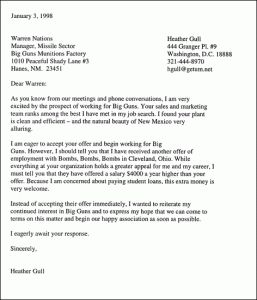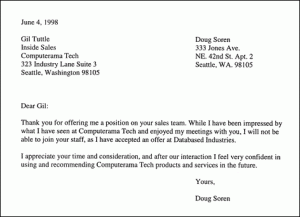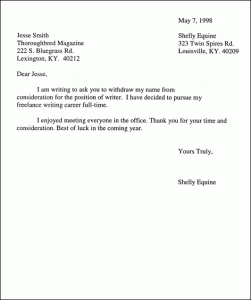Sample Thank You Letters
Sample Thank You Letter: Recent Graduate Recruiting
Ms. Monica Sheffield
Manager, Corporate Development
Diamond Publishing
204 Morgantown Drive
Clarksburg, IL 60606
Dear Ms. Sheffield:
I want to thank you for meeting with me to discuss the Marketing Associate position on Thursday. After hearing about the company and the job responsibilities of the position, I am very excited about the prospect of working at Diamond Publishing.
My qualifications are well-matched with the position, and I have a real interest in this area of work. My experience with event planning and the organizational and communication skills I learned in this capacity are among my strongest attributes. I feel they would enable me to make a strong contribution to Diamond.
Again, thank you for the interview and your consideration. I look forward to hearing from you. Please feel free to call me at 302-555-1212 if you have any further questions.
Sincerely,
Michael DiSanto
Sample Thank You Letter: Experienced Jobseeker
Mr William Chen
Uber.com
212 President Dr., Suite 300
Boca Raton, FL 33486
Dear Mr Chen,
Thank you for taking the time to discuss the technical support manager position at Uber.com with me. After meeting with you and learning about the company’s operations, I am convinced that my background and skills coincide well with your needs.
I appreciate the time you took to talk with me about the job responsibilities and the company. It gave me insight into why Uber.com has been a success. I feel I would be a good fit for the position, especially given my experience in digital rights management.
In addition to my experience from my previous technical support and management positions, I feel I bring a strong work ethic and team-oriented attitude, both of which I know to be essential to success in tech support. I look forward to hearing from you about the position.
Sincerely,
Jerome Connolly
Sample Thank You Letter: Mid-Level Job Search
Ms. Monica Sheffield
Manager, Corporate Development
Diamond Publishing
204 Morgantown Drive
Clarksburg, IL 60606
Dear Ms. Sheffield:
I want to thank you for meeting with me to discuss the Marketing Associate position on Thursday. After hearing about the company and the job responsibilities of the position, I am very excited about the prospect of working at Diamond Publishing.
My qualifications are well-matched with the position, and I have a real interest in this area of work. My experience with event planning and the organizational and communication skills I learned in this capacity are among my strongest attributes. I feel they would enable me to make a strong contribution to Diamond.
Again, thank you for the interview and your consideration. I look forward to hearing from you. Please feel free to call me at 302-555-1212 if you have any further questions.
Sincerely,
Michael DiSanto
Can This Interview Be Saved? Maybe With a Proper Thank You Note and Follow Up
After sending reams of resumes, you’ve finally snagged that coveted interview. But on the big day, you screw up by showing up 10 minutes late to the interview. Or forget to mention the big project you spent last year perfecting. Or your cell phone goes off–and you answer it.
Can this interview be saved?
Maybe. The thank you note and the telephone call can help an applicant point out overlooked experiences or clear up misunderstandings. But even the most gracious thank you note will fail to make right a particularly egregious interview error.
“I heard a story about a woman interviewing for a job, and she was doing well,” said Barbara Pachter, an author and president of Pachter and Associates, a New Jersey business etiquette firm. “And then her cell phone began ringing. She answered the cell phone, had a conversation, and then started to scream at her kids, because it was her kids who called. She went on and on, and then turned to her interviewer and said, ‘Oh, my kids will never call me from work.’ She didn’t get the job. And there’s nothing she could have done to recover from that faux pas.”
Say Thank You The Right Way: Thank You Note Tips
Are thank-you notes a relic of a bygone era when workers wore starched white shirts and neatly-pressed suits to work every day?
Many job hunters think so. But they’re wrong, say employment experts.
Letters or emails of appreciation, especially after a job interview, are as necessary as ever in our increasingly casual culture. This is your chance to remind your potential boss of your qualifications, how you would fit in with company culture and to makeover any mistakes you made in the interview.
“You want to stay on their radar screen and out of the garbage can,” says Bob Rosner, author of Working Wounded: Advice that Adds Insight to Injury, explaining why you should consider thank-you notes another chance to prove yourself.
If you really want an offer, send not only words of thanks but added-value attachments, including compelling news articles about the industry, the company or the competition, suggests Rosner, who is also a career columnist.
“Information is the ultimate currency because it helps people do their job,” he says. ?The attitude you will be conveying is “I have my ear to the ground and am investing energy into [the job search] beyond what I did in the interview.”
What? Me send a thank-you note?
We know. You don’t do thank you notes. Only 35 percent of workers surveyed by Vault last year said they always send thank you notes following interviews. Nearly 15 percent of people never, or almost never, follow up with a letter or email even though 43 percent of them say such notes could be very important in getting a job.
Rosner’s Working Wounded readers have similar habits. In his poll, 37 percent of his respondents say they always write thank you notes or letters. Twenty-two percent never do it and 41 percent say they do only when they really want to impress their interviewers.
Among Vault’s thank-you note rejectionists, 63 percent agreed with the statement “There’s no need. If they want me, they will hire me.” (Keep in mind, the poll was done in November 2000, back in the days when the job market still favored workers.)
Most people don’t exactly reject the concept of thank you notes. They simply were never taught the importance of them, says Barbara Pachter, author of When The Little Things Count…And They Always Count: 601 Essential Things That Everyone In Business Needs to Know.
“Once people realize how crucial it is, they do it,” Pachter says.
A business-training consultant, Pachter advises employees to send notes for almost any occasion calling for an express of gratitude, even after a round of golf with a more senior partner.
“If you’re ever in doubt, do it,?” says Pachter, of Cherry Hill, N.J.
She recalls telling this to a group of accountants during a training session, and getting groans from the crowd. The discussion ended however when one of the founding partners stood up and said he always hand writes thank-you notes.
“If the head of the company does it, there was no point in arguing,” she says.
Perhaps more job hunters would send notes if they knew this: Thirty-six percent of hiring managers polled by Vault say thank you notes always help a candidate’s job prospects while another 42 percent say it could help when deciding between two or more qualified candidates. Only 22 percent said, in so many words, not to bother.
A Simple Thanks is All We Ask
Small social niceties are appreciated well out of proportion to the actual time it takes to do them. A thank you note both recognizes that something nice has been done for you, and fixes you in the recipient’s mind as a kind, thoughtful person. Indeed, even the successful and busy who take the time out to be socially gracious are recognized as such. President George Bush and his wife Barbara were famous in Washington for their rafts of thank you notes. Today, people remember Bush as a man of high character (at least when compared to his successor). Coincidence? Perhaps not.
According to Vault’s exclusive Interview Manners Survey, which surveyed 675 employees and employers, more than 35 percent of employers said that a thank you note “always helps” a candidate, and and additional 42 percent said that it helps when deciding between two qualified candidates. Said one employer: “I have gone out of my way to hire/refer to my network candidates who have the grace to send a thank you note.”
Quality counts too – in one celebrated study, a researcher who sent out poor quality cards to people he didn’t know received a response rate of 10 percent – but when he sent out glossy, attractive cards, his hit rate went up 37 percent. Given this evidence, you may want to take the time out to have personalized thank-you cards made up. Don’t worry: not all personal engravers charge Tiffany rates. Shop around.
Send a thank-you note whenever someone’s done you a favor. Send them when you get a present, send them when you attend dinner at someone’s house, send them to the person who organizes your going-away party at the office, send them to the professor who writes you a recommendation for law school or an internship. Don’t procrastinate – keep a box next to your phone or on your desk. Make a note whenever someone does something worthy of a thank-you note – and send it right away. Your action may be one of the first steps towards a schmoozy, more civil society.
Acceptance Letters Should Be More Than Acceptable
You did it! You negotiated the cover letter minefield, and they loved you. But get ready to start writing again.
If the job you accept involves a number of agreements such as salary, health benefits, a 401(k), stock options, annual raises, vacation days, work hours, and travel, then your acceptance letter can ensure that you and your employer have a mutual understanding about your terms of employment. Subjects discussed in interviews and settled through verbal agreements can often be forgotten or misinterpreted, so you may have the need to clarify things now.
The format for these letters is less rigid (since you already have the job, unless your send in some chicken scratch written on construction paper with crayon, you’ll probably be fine), but you obviously want to start you new job on the best note possible. Here’s a basic format that makes writing acceptance letters easy and effective:
First paragraph. Time for pleasantries. First, formally (and with great pleasure) accept the job you’ve been offered, making sure to list the exact title of the job you’ve been given. Tell them how much you enjoyed coming in and meeting them at the interview and how you’re looking forward to working with them and the company.
Middle paragraph(s). Here’s where you outline exactly what job you understand you’re accepting. The type of work you’ll be doing and the compensation you’ll be given should be restated here to ensure an understanding between you and your employer. Try to avoid scary legalistic prose; you don’t want to spook your new boss with this letter. It’s not a legal contract, after all, but an assurance of mutual understanding.
Last paragraph. Time to give thanks to the people who made your employment possible. No, not your mom, and not “the little people.” The people you want to thank are the people who gave you the offer: your employers. Then, tell them what day and time you will see them next: a polite way to confirm your starting date.
Your career doesn’t depend as heavily on your acceptance letter as your initial cover letter, but does signal professionalism and foresight. But besides making a good impression, a well-drafted acceptance letter explicitly accomplishes several things: it confirms in writing your acceptance of a job offer, it expresses your gratitude, and it helps cement the promise of benefits and pay that your employers have already made verbally.
![]()
No Thanks, but Thanks
When the employer left your interview more impressed than you were, you’ll be in a position to decline the offer they presented you with. You should first decline politely over the phone so the employer can offer the job to the next-best applicant as soon as possible. However, a true professional never lets any future networking opportunity turn into a dead end. Particularly in today’s job market, in which employees flit between companies like pollinating bees, you need to keep your options open for the future.
Also, regardless of the outcome of your job search, you want to send a thank you letter to the contact who got you in the door in the first place. Contacts need to be maintained, and even if things didn’t go as hoped this time, that doesn’t mean that next time they won’t. If you treat the contact properly, they’ll be more inclined to keep their ear to the ground for future openings they may hear about.
Even if a contact is one of your best friends, don’t take him or her for granted. We all have lots of friends, but how many would you recommend to come work at your place of business? A professional note of thank you is not only considerate, it shows that you can handle yourself gracefully in a business setting.
In the following pages, we give examples of three different types of decline letters. The first writer has received a better offer, but her letter honestly and politely keeps the door open while inviting the first employer to sweeten the offer. The second letter is an outright turndown, but the writer’s graciousness ensures that his interview can serve him well in the future. The third writer has withdrawn her name from consideration, but has briefly given her reasons for doing so, preventing herself from seeming flaky.


